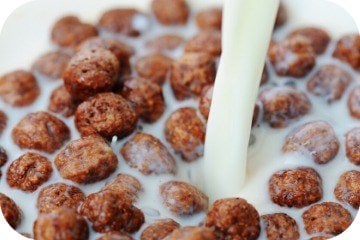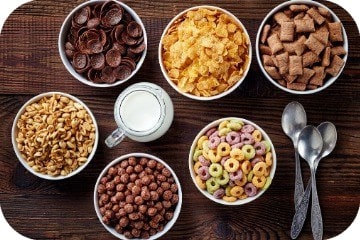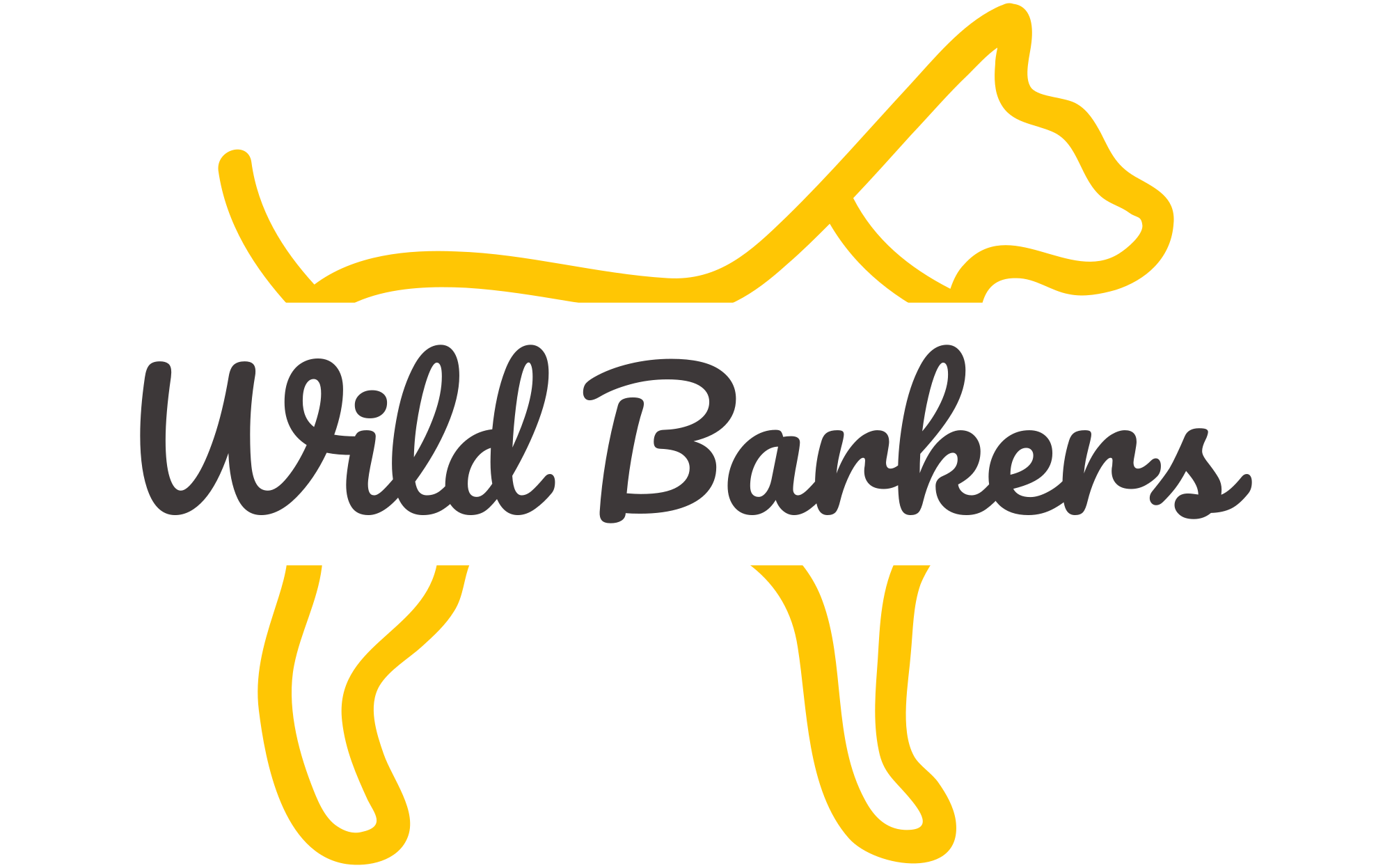
Can dogs eat cereal? It depends. Most cereals are safe for dogs, and a small amount is considered ok, but it depends on the ingredients. There are several ingredients commonly used in cereal that needs to be avoided, like chocolate, grapes, raisins, and sweeteners, as these can be toxic.
Cereal does not have nutritional benefits for dogs, and most contain a considerable amount of sugar, which is not recommended for dogs. Although it might be safe, it is not the healthiest option.
Cereal should not be used instead of nutritionally balanced food, but some types can be used as occasional dog treats.
Busy? Get Your Hands Paws On The Answers Quickly…
WHAT ARE THE RISKS OF CEREAL?

Milk
Pretty much everyone serves their cereal with milk, but this additive isn’t always recommended for dogs.
Once weaned from their mother’s milk, dogs no longer need milk as part of a balanced diet. While this isn’t toxic to dogs, most are unable to digest it. Lactose is one of the leading food intolerances in dogs.
This means milk can cause stomach upset, including vomiting and diarrhea, along with smelly gas and stomach pains.
If dairy doesn’t upset your dogs’ stomach. A treat of milk or yogurt can be fed occasionally. But make sure to do so sparingly as it does contain high amounts of sugar and fat.
Sugar
Dogs do not need extra sugar added to their diet, and cereals are notorious for having high sugar content. Dogs do require some sugar, but it is found in their dog food, usually from grains, sweet potatoes, and other vegetables.
Side Effects Of Sugar:
Diabetes – This occurs when the body is not producing enough insulin, or the body is unable to utilize it effectively. High amounts of sugar can lead to obesity, which is one of the leading causes of diabetes. Signs of diabetes include increased thirst, urination, and appetite.
Obesity – Sugary food is usually high in calories. These are empty calories that do not fill hunger, meaning your dog will continue to eat. This can easily lead to weight gain. Excess weight can have a significant impact on your dog, including joint problems, heart conditions, and lethargy.
Dental Issues – Sugar reacts with bacteria to produce acid, which erodes the teeth. A high sugar diet can lead to cavities and dental work for your furry friend.
Hyperactivity – Dogs usually have a lower tolerance for sugar than humans. This means that just a small quantity can lead to a change in behavior, often for the worst.
Vomiting and Diarrhea – Any new food can lead to an upset stomach in dogs. It is not uncommon for a dog to experience vomiting and diarrhea after consuming sweet treats.
Pancreatitis – Obesity and diabetes are two contributors to pancreatitis. This is inflammation of the pancreas, which can cause an upset stomach and pain for your dog.
The main concern with cereal is the possibility of it containing life-threatening ingredients. Always be sure to check the packaging for these before sharing them with your furry friend.
Raisins – Raisins are known to be toxic to dogs in any amount. It is not known which compound is fatal to dogs yet. But as little as one raisin (or grape) can cause kidney failure.
Chocolate – Chocolate is present in a vast amount of cereals, particularly those aimed at kids. Chocolate can be fatal to dogs as it contains theobromine and caffeine. Both react with the nervous system and speed up their heart rate. This can cause restlessness, increased urination, hyperactivity, seizures, collapse, and death. Larger dogs are thought to be able to tolerate more than smaller dogs.
Xylitol – This is a sugar substitute. It is commonly used in low-sugar or ‘healthy’ cereal. Humans can process it, but dogs cannot. Dogs cannot distinguish between xylitol and sugar. This means their body releases insulin when it is consumed. As there is no sugar present, it can cause hypoglycemia.
Signs of hypoglycemia include:
- Tremors
- Weakness
- Lack of energy
Nuts – Some nuts are toxic or can be contaminated with toxins. The mains ones to avoid are macadamia, walnuts, and pecans. That said, all nuts are high in fat and can cause obesity and pancreatitis in dogs. If you are looking to feed your dog nuts, use safer varieties, such as cashews, peanuts, and coconut. Make sure to do so in moderation as an occasional treat.
Nutritional Value
Cereal doesn’t offer any nutrients to dogs. It is usually high in sugar. It is more considered junk food and therefore should be given sparingly, if at all.
There are plenty of other much healthier snacks available for your dog, including fresh fruit and vegetables. Our favorites are carrot, apple, sweet potato, and banana.
Choking Risk
Dogs do not chew, taste, and savor their food as their dog owners do. Dogs are scavengers and pack animals, in the wild they would eat their food as quickly as possible to avoid fights. Their throat also has the ability to expand to allow them to swallow larger pieces of food and then digest it in the stomach.
This means that cereal’s shape and texture can make it a choking hazard and can cause intestinal blockages.
Wheat, Gluten, or Grain Allergies
Wheat is a fairly common allergen in dogs. Symptoms of an allergy include itching, dry skin, ear infections, paw chewing, and excessive licking. Most commercial cereals include wheat or corn. If your dog is allergic or intolerant to either, it is best to avoid cereal altogether.
WHAT KIND OF CEREAL CAN DOGS EAT? 24 TYPES

No cereal is preferable for dogs. Never feed your dog cereal containing chocolate, raisins, dangerous nuts, or xylitol sweetener. Any other cereal given to dogs should be done so as a small, infrequent treat. Treats should only make up a maximum of 10% of your dogs’ diet. Dogs should receive all of the nutrients they require in their regular dog food. Cereal should never be used as a substitute.
Ok For Dogs
While cereal isn’t necessary for a dogs’ diet, the below cereals are healthier choices. They are 100% whole grain with no added sugar.
- Dry Shredded Wheat
- Oatmeal Made With Water
Not Recommended For Dogs
All of the cereals below are not recommended for dogs to eat. They contain a high amount of sugar and have no health benefits. However, they do not have any known toxic ingredients at present.
If your dog has happened to eat some by accident, there should not be any severe effects, other than maybe gastric upset and hyperactivity due to the levels of sugar.
- All Bran
- Apple Jacks
- Bran Flakes
- Cap’n Crunch Breakfast Cereal, Crunch Berries Cap’n Crunch Breakfast Cereal, Original
- Cheerios
- Cinnamon Toast Crunch
- Corn Flakes
- Frosted Flakes
- Fruit Loops
- Fruity Pebbles
- Golden Nuggets
- Honey Bunches Of Oats
- Honey Nut Cheerios
- Life
- Lucky Charms
- Rice Krispies
- Shreddies
- Special K and Special K Red Berries
- Weetabix
Could Be Fatal To Dogs
All of the below cereal include ingredients that can be extremely dangerous to dogs, as advised above.
If your dog has eaten any of the below, try to calculate the amount and contact your veterinarian for advice. Your vet will recommend the next steps in regards to the ingredients, size, weight, breed, and amount of cereal eaten.
- Coco Krispies
- Cookie Crisp
- Granola Containing Raisins, Chocolate, and Toxic Nuts (macadamia, pecans, walnuts, and pistachios)
- Raisin Bran Crunch and Raisin Bran
- Reeses Puffs
FAQS
Can dogs drink milk?
It depends, many dogs are lactose intolerant, so milk should be avoided. However, if your dog can tolerate lactose, it can be given as a rare treat.
Can dogs eat bread?
Usually yes, although it has little to no nutritional benefit for them.
Can dogs eat bananas?
Yes, in moderation. A small amount of banana is excellent as a healthy treat.
Can dogs eat rice?
Yes, rice is often used in commercial dog food. White rice is also easy for dogs to digest, so it is commonly prescribed for a gastric upset.
Is cheese bad for dogs?
It is high fat, so it shouldn’t be fed too often. However, it is usually safe for dogs (unless they struggle to digest dairy) and can be given as a treat.
Can dogs eat pasta?
Yes, but it has little to no nutritional value for them, so it should only be fed in moderation.
Looking for more awesome posts? Check these out…
Can Dogs Eat Lettuce?
How To Make A Snuffle Mat
When Do Puppies Lose Their Teeth?
Can Dogs Eat Broccoli?
Can Dogs Eat Watermelon?
Disclaimer: Each dog is different, and every circumstance is different. All efforts have been made to provide accurate information. However, it is not provided by a qualified Veterinarian, Veterinarian Surgeon, or Behaviorist. The information provided is purely educational. The information should not be used as an alternative or substitute for medical care. If you have any health or medical concerns, contact a qualified Veterinary Surgeon or Veterinarian immediately.










No Comment! Be the first one.